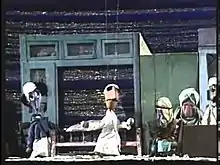El Leila El Kebira
El Leila El Kebira (الليلة الكبيرة) (The Grand Night or The Big Night) is a 1961 Egyptian puppet-operetta that was written by poet Salah Jahin with the music composed by Sayed Mekawy. Approximately 40-minutes in length, it formed a big part of the Egyptian folklore due to its expressive and funny depiction of the moulid and has since been performed occasionally throughout the 1960s until today.[1]
| El Leila El Kebira (الليلة الكبيرة) | |
|---|---|
 Screenshot of the play | |
| Written by | Salah El-Sakka Sayed Mekawy (music) |
| Date premiered | 1 May 1961 |
| Original language | Arabic |
| Subject | Moulid |
| Genre | Comedy, Puppetry, Operetta |
| Setting | Egypt |
Plot
The operetta describes the celebration of the last night of the moulid, a festival celebrating the Prophet Mohamed’s birthday, through the displaying of the activities done in an Egyptian village. Through a playful colorful and musically lively manner, it centers on displaying certain scenes from the carnival and the circus including food stall vendors, a fortune teller, hummus, circus performers (such as jugglers, clowns and lion tamers) and bellydancers, with catchy Egyptian folk songs and rhythms [2] [3]
Among the notable vocalists who have appeared in it are Sayed Mekawy and Salah Jahin.[4][5]
Credits
Crew
- Decoration: Mostafa Kamel
- Theatre direction: Salah El Sakka
- TV Direction: Mahmoud Bayoumi
Vocalists
- Shafiq Jalal
- Abdo Alsrouji
- Mohamed Roshdy
- Houria Hassan
- Ismail Shabana
- Salah Jahin
- Shafia Ahmed
- Hoda Sultan
- Sayed Mekawy
Productions
Originally in black and white, it was first colourised in the early 1980s. In 2001, it was performed by the Cairo Opera Ballet Company, which was directed by Abdel Moneim Kamel.
In November 2011 and July 2020, the play attracted large number of audiences at the Cairo Opera House.[6]
In November 2014, musical theatre group Fabrica made a live-action rendition of the play which involved real people as instead of puppets.[7]
The play was performed at the 34th Neapolis International Festival Kid’s Theatre in Tunisia in December 2019.
A ballet version, directed by Abdel Moneim Kamel, was broadcast on Egyptian Ministry of Culture’s Youtube channel in March 2020, which was part of the “Stay at home.. Culture in your hands” motivation, initiated by Culture Minister Enas Abdel-Dayem as part of the effort to stop the spread of coronavirus (COVID-19).[8]
Legacy
The play became an instant success in 1960 after it was first shown. Following its success in Egypt, it began to tour the world with international honours beginning with Bucharest’s International Puppet Festival (1960), where it won awards for puppet and scenography designs. These achievements continued over the years as the play continued to collect awards and recognition in Syria (1967), the US (1980), Jordan (1993), France (1995), Italy (1997) and Tunisia (2000). The play remains one of the most important theatrical acts of the 1960s in Egypt, and arguably across the Arab world, due to its cultural relevance, nostalgia and golden age of Egypt's music.[9]
Animated film
An animated film based on the play will be released in 2022. Max Howard, the former president of Warner Brothers and studio executive of Disney’s The Lion King, and Maggie Malone, a creative executive at Disney, were consulted by the producers Ahmed Hammouda and Abdulrahman Khedr during the production of the animated feature. The trailer was released on September 2020.[10]
References
- Masrees : A Big night for "El Leila El Kebira" http://www.masress.com/en/dailynews/107359
- Cairo Live Event Guide : El Laila El Kebira http://cairoliveeventsguide.blogspot.com/2008/09/el-laila-el-kebira-puppet-musical.html
- Ahram Online : Lorkiana and El Leila El Kebira http://english.ahram.org.eg/NewsContent/5/33/29442/Arts--Culture/Music/PHOTO-GALLERY-East-West-bonanza-Lorkiana-and-El-Le.aspx
- The Book : الليلة الكبيره وخمس مسرحيات http://www.goodreads.com/book/show/6137925
- "الصفحة الرئيسية - فرقة بالية أوبرا القاهرة عرض"الليلة الكبيرة"". Moc.gov.eg. 2013-07-17. Archived from the original on 2013-08-03. Retrieved 2013-07-21.
- Egypt's famed puppet play El-Leila El-Kebira, Moliere's The Miser staged at Cairo Opera House grounds by Ahram Online
- Fabrica Brings Puppetry to Life in El Leila El Kebira by The Caravan
- Ballet version of iconic puppet show El Leila El Kebira to be broadcast on Youtube tonight by Egypt Independent
- El Leila El Kebira: Egypt’s iconic puppet operetta by The Popular Chorus
- El Leila El Kebira: The Iconic Puppet Operetta Becomes A Full-Feature Animation And The Trailer Is Magic! by Scoop empire
Bibliography
- "Salah Jaheen". Egypt State Information Service. Archived from the original on 2008-11-20. Retrieved 2006-09-30.
- Salah Jahin form arabworldbooks